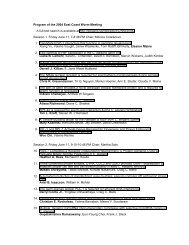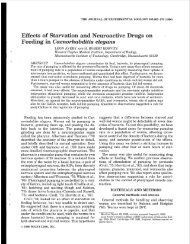West Coast Worm Meeting Abstracts - Caenorhabditis elegans ...
West Coast Worm Meeting Abstracts - Caenorhabditis elegans ...
West Coast Worm Meeting Abstracts - Caenorhabditis elegans ...
You also want an ePaper? Increase the reach of your titles
YUMPU automatically turns print PDFs into web optimized ePapers that Google loves.
STATE-DEPENDENT LEARNING IN C. ELEGANS.<br />
Jill C. Bettinger, Steven L. McIntire<br />
Gallo Center and Program in Biological Sciences, Department of Neurology, UCSF<br />
The execution of learned behaviors may be triggered by contextual information, consisting of<br />
environmental cues or the internal state of the organism. State-dependent learning refers to the ability of<br />
an organism to more effectively execute learned behaviors if the organism experiences internal contextual<br />
influences similar to those experienced when the learning occurred. Such contexts can be<br />
pharmacologically manipulated by treating with cholinergic compounds, opiates, cocaine and<br />
amphetamines, and with neurodepressants such as ethanol and barbituates 1 . <strong>Worm</strong>s become<br />
intoxicated by ethanol in a manner similar to that of most other organisms tested (see abstracts by A.<br />
Davies and H. Kim, this meeting). We have sought to study the mechanisms of ethanol-induced<br />
state-dependent learning in worms.<br />
Olfactory adaptation in C. <strong>elegans</strong> is a decrease in the chemotaxis response to an odorant as a result of<br />
prior exposure to the odorant 2 . We demonstrate a form of state-dependent learning in worms by pairing<br />
olfactory adaptation and ethanol administration. Ethanol does not interfere with olfactory adaptation,<br />
however, worms exposed to an odorant while being treated with ethanol will only show subsequent<br />
adaptation to the odorant if ethanol is again administered during chemotaxis testing. If the odorant is<br />
presented without ethanol during testing, the animals behave as naïve animals and therefore fail to alter<br />
their behavior based on their previous experience or prior exposure to the odorant.<br />
Further, we demonstrate that the state-dependent effects of ethanol require normal dopaminergic<br />
function. The dopamine-defective cat-1 4 and cat-2 5 mutants are able to adapt to volatile odorants,<br />
however, they do not show state-dependency when they are adapted to volatile odorants while<br />
intoxicated by ethanol. These results suggest that C. <strong>elegans</strong> is capable of a form of learning and indicate<br />
a conserved role of dopamine in the modulation of behavioral responses to ethanol.<br />
1 Izquierdo. in Neurobiology of Learning and Memory (eds Lynch, McGaugh, and Wienberger) 333<br />
(Guilford, New York, 1984).<br />
2 Shulz, Sosnik, Ego, Haidarliu and Ahissar (2000) Nature 403, 549, and references therein.<br />
3 Colbert and Bargmann (1995) Neuron 14, 803.<br />
4 Duerr et al. (1999) J. Neuroscience 19, 72.<br />
<strong>West</strong> <strong>Coast</strong> <strong>Worm</strong> <strong>Meeting</strong> 2000<br />
5 Lints and Emmons (1999) Development 126, 5819.<br />
26




